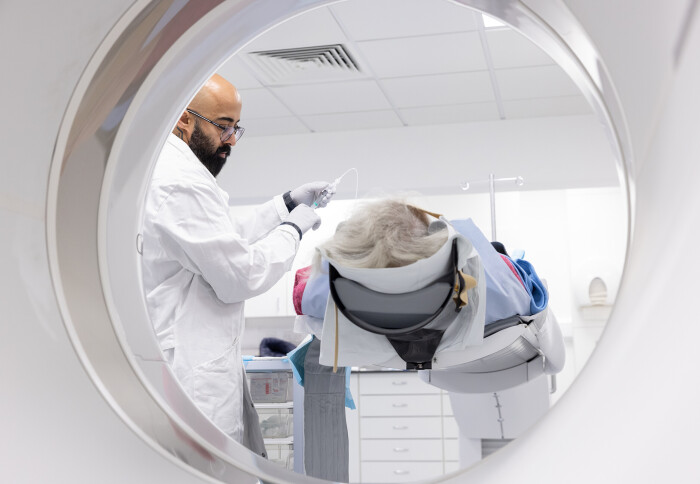State-of-the-art clinical imaging facility relaunches at Hammersmith Campus
by Meesha Patel

Imperial’s Clinical Imaging Facility provides researchers across the university access to the latest scanning technologies.
The Imperial College London Clinical Imaging Facility at the Hammersmith Hospital Campus provides research support and technology for interdisciplinary research activities across the university to drive scientific innovation.
The facility received a funding boost for the installation of a new Positron Emission Tomography (PET) Scanner from the Medical Research Council earlier this year, which led to a wider renovation project over summer 2024. The new facility launched on the 20 November at an open day event.
The facility is now equipped with a sophisticated whole-body PET-CT, a scanner designed for oncological, neurological, and cardiac imaging, as well as a Magnetic Resonance Imaging (MRI) scanner, four uptake rooms, patient changing facilities and waiting room.
"The Clinical Imaging Facility provides specialist in-house support for our researchers at Imperial but also our external and industry partners to ensure that we are driving forward scientific innovations." Professor David Sharp Clinical Imaging Facility
This new equipment means that the facility can now support research from across Imperial’s faculties and industry in-house at Imperial’s Hammersmith Hospital Campus. People wishing to work with the facility should get in touch with the Clinical Imaging Facilty’s Manager.
Professor David Sharp, Scientific Director of the Clinical Imaging Facility said: “The Clinical Imaging Facility provides specialist in-house support for our researchers at Imperial but also our external and industry partners to ensure that we are driving forward scientific innovations. Advanced imaging is particularly important to human disease, and now we can use a range of different scanning capabilities to gain a better understanding of diseases, as well as investigate the effects of new treatments.”
Access to advanced imaging
The team at the Clinical Imaging Facility can use a range of equipment to support applied research studies and they encourage people interested to get in touch with a project notification form.
Imaging resources include:
- A Siemens 3T Verio MRI Scanner which is suitable for many body regions and applications. The relatively large size (compared to most MRI systems) ensures a higher degree of comfort and compliance.
- A 32-channel Electroencephalography (EEG) system compatible with functional MRI.
- The Siemens Biograph mCT-S 64 is a sophisticated whole-body PET-CT scanner which is a noninvasive method to produce high quality CT and PET images. A blood sampling system is available to studies who require it and there is an adjacent tissue/blood processing lab.
- MRI compatible transcranial electric stimulators (TES) which can be used to provide non-invasive brain stimulation in humans and can be controlled remotely.
Research impact
"Staff at the Clinical Imaging Facility made [this study] happen, and the patients and carers were hugely impressed with the team's professionalism and hospitality, which made the patient journey effortless." Professor Paul Edison Department of Brain Sciences
The facility has already had a significant impact on scientific discoveries at Imperial College London.
Research led by Professor Paul Edison showed that the drug Liraglutide, a GLP-1 analogue which works in a similar way to Ozempic, reduced brain shrinkage in Alzheimer’s patients by almost 50%. In the study 204 patients with Alzheimer’s disease were scanned with magnetic resonance imaging before the trial began, as well as having glucose metabolism PET scans and detailed memory testing. All patients from different parts of the UK, including Scotland and N. Ireland travelled to the Imperial College Clinical Imaging Facility for the PET and MRI scans.
“Imperial's Clinical Imaging Facility was critical to perform complex PET and MRI scans for this innovative study. The scans were long and complex due to the nature of the study. Staff at the Clinical Imaging Facility made it happen, and the patients and carers were hugely impressed with the team's professionalism and hospitality, which made the patient journey effortless". highlights Professor Paul Edison, Professor of Neuroscience in the Department of Brain Sciences.
The team also supports research further afield with external industry partners and other universities. The PREVENT study for example, aims to identify the earliest signs of Alzheimer’s and neurodegenerative diseases and uses the facility for brain scanning. Participants were seen in an initial visit and then visited the facility two and five years later so that any changes could be tracked. The researchers are particularly interested in discovering which features define people who are at higher risk of developing neurodegenerative disease. The study is in partnership with Imperial College London, with the other centres including the University of Cambridge, University of Edinburgh, University of Oxford and Trinity College Dublin.
Find out more about the Imperial Clinical Imaging Facility
Interested in using this facility? Get in touch with the Clinical Imaging Facility Manager Dr Albert Busza.
Article supporters
Article text (excluding photos or graphics) © Imperial College London.
Photos and graphics subject to third party copyright used with permission or © Imperial College London.
Reporter
Meesha Patel
Faculty of Medicine Centre
